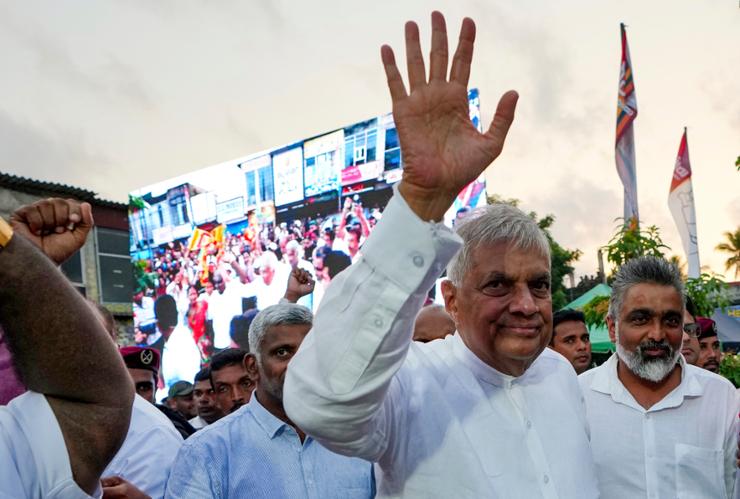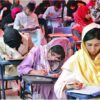Sri Lanka
COLOMBO: Cash-strapped Sri Lanka is set to vote in a crucial election on Saturday, which many view as a referendum on the unpopular austerity measures imposed under an International Monetary Fund (IMF) bailout plan.
This election marks the first presidential vote since the country’s unprecedented financial crisis, and the results will determine whether the island nation continues with the stringent policies or opts for change.
President Ranil Wickremesinghe, 75, is seeking a fresh mandate after taking credit for stabilizing Sri Lanka’s economy and ending the severe shortages of food, fuel, and medicine that plagued the country for months.
Under his leadership, calm has been restored after mass protests and civil unrest erupted in 2022, culminating in the storming of the presidential compound and the departure of his predecessor.
Wickremesinghe has emphasized the difficult circumstances under which he took office, reminding voters of the chaos they experienced. “Think of the time when all hope was lost… we didn’t have food, gas, medicine, or any hopes,” he said in his final campaign speech. “Now you have a choice. Decide if you want to go back to the period of terror, or progress.”
However, his administration’s austerity measures — including tax hikes — were implemented as part of the conditions tied to a $2.9-billion IMF bailout. These policies have significantly burdened the population, with millions struggling to make ends meet. The economy remains fragile, and Sri Lanka’s foreign debt, which totals $46 billion, has yet to be serviced following a government default in 2022.
Wickremesinghe remains firm in his commitment to continuing the austerity programme if re-elected, warning that deviating from the IMF’s plan would lead to further economic difficulties. “The election will largely be a referendum on how Wickremesinghe’s government has handled the economic crisis and the ensuing modest recovery,” the International Crisis Group said in a recent report. The report also highlighted the widespread public discontent over austerity measures, which many perceive as unjust.
One of Wickremesinghe’s key challengers is Anura Kumara Dissanayaka, the leader of a once-marginal Marxist party with a controversial history of violence during the 1970s and 1980s.
The party, known for its failed uprisings that resulted in the deaths of over 80,000 people, received less than 4% of the vote in the last parliamentary elections. However, Sri Lanka’s financial collapse has provided Dissanayaka with a platform to attract new supporters by pledging to reform the country’s corrupt political system.
Analysts suggest that Dissanayaka is benefiting from public frustration over corruption and mismanagement, which many see as the root causes of the economic crisis.
“There is a significant number of voters trying to send a strong message… that they are very disappointed with the way this country has been governed,” Murtaza Jafferjee of the Advocata think tank told AFP.
Another formidable contender is Sajith Premadasa, a 57-year-old opposition leader and former deputy to Wickremesinghe. Premadasa has campaigned on a platform of securing concessions from the IMF and easing the burden of the austerity measures.
He has focused his criticism on the current tax code, which he argues is forcing professionals to leave the country in search of better opportunities abroad. “We will revise the unfair burden-sharing structure of the IMF-supported tax code revision,” Premadasa promised in his campaign manifesto.
The economic toll on the country has been severe. Official data reveals that the poverty rate in Sri Lanka doubled to 25% between 2021 and 2022, adding 2.5 million people to the already significant number living on less than $3.65 a day. Though inflation, which peaked at 70% during the height of the crisis, has now fallen below 5%, the recovery remains tenuous.
According to the IMF, while Sri Lanka has made “a lot of progress,” the road to recovery is still fraught with challenges. “The country is not out of the woods yet,” said IMF spokesperson Julie Kozack, emphasizing the importance of protecting the hard-won economic gains achieved so far.
The election will serve as a critical test of whether Sri Lankans are willing to endure more short-term pain in the hope of future stability or if they will opt for a new direction and leadership that promises relief from the stringent IMF programme.
I am a dynamic professional, specializing in Peace and Conflict Studies, Conflict Management and Resolution, and International Relations. My expertise is particularly focused on South Asian Conflicts and the intricacies of the Indian Ocean and Asia Pacific Politics. With my skills as a Content Writer, I serve as a bridge between academia and the public, translating complex global issues into accessible narratives. My passion for fostering understanding and cooperation on the national and international stage drives me to make meaningful contributions to peace and global discourse.










